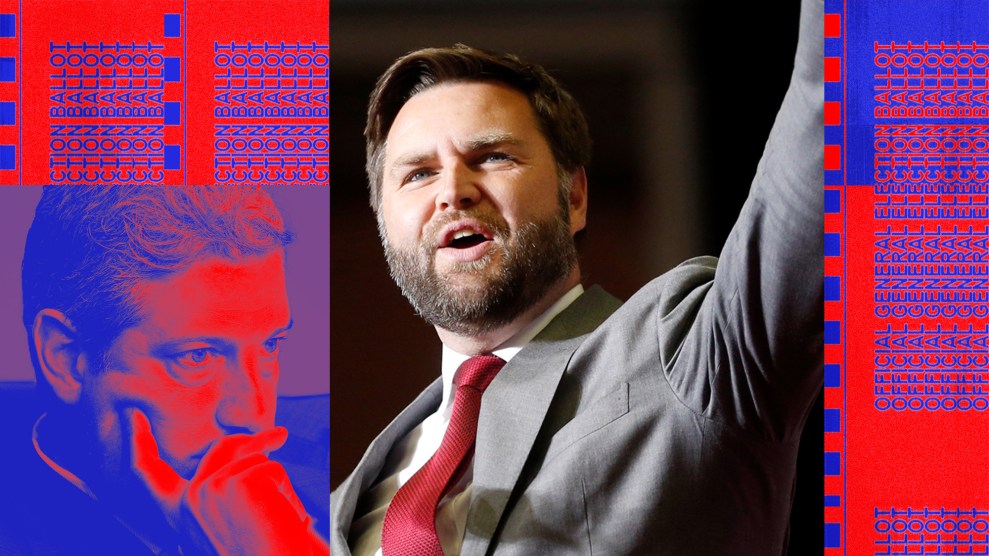
Former President Donald Trump and Sen. JD Vance, (R-Oh), at the East Palestine Fire Department in the aftermath of the Norfolk Southern train derailment Feb. 3 in East Palestine, Ohio.Matt Freed/AP
On Monday, Ohio Senator J.D. Vance accused the email newsletter platform Mailchimp of “big tech censorship.”
“You can’t make this up,” Vance wrote on Twitter. “Mailchimp suspended my press team’s account after we announced President Trump’s support for the Railway Safety Act.”
You can't make this up: Mailchimp suspended my press team’s account after we announced President Trump’s support for the Railway Safety Act. But big tech censorship won't stop us from fighting for the people of East Palestine.
— J.D. Vance (@JDVance1) May 8, 2023
At first glance, the idea seems a bit hard to believe—like you could, in fact, make this up. The Railway Safety Act was introduced by Vance, along with Senator Sherrod Brown (D-Ohio), in response to the disaster in East Palestine. The bill would bolster safety regulations for trains carrying hazardous materials, require a minimum two-person crew for certain freights, and establish new requirements for defect detection systems. The legislation has endorsements from both president Biden and former president Trump.
Was “big tech” really suspending accounts for promoting a bill that has bipartisan support?
What happened seems to have been more mundane—and a window into how tech platforms go about managing what content can and cannot be posted. On Monday, Senator Vance’s Press team sent out a press release by email that highlighted Trump’s support for Vance’s rail bill. The release linked a post by Trump made on his social media platform Truth Social. (Punchbowl News reported that the former president’s endorsement would be key in getting other Republican senators on board.) Then, Vance’s Mailchimp account was deactivated for over 20 hours, according to a spokesperson from Vance’s office.
Mailchimp denied censorship, claiming this was part of normal procedures. “Senator Vance’s account was flagged by an automated system, but upon human review in line with our terms of service, the account was found to be in good standing and immediately reinstated with all features available,” the company said in a statement. “We have been in contact with Senator Vance’s office.”
Mailchimp uses an automated abuse prevention system called Omnivore. Vance’s office said they had sent upwards of 40 press releases with Mailchimp without issue. This was the first time that they’d included a hyperlink to Truth Social. And this was the first time they were banned.
Mailchimp sends a billion emails every day. One could assume that there were other emails sent on Monday that included a mention of Donald Trump, or perhaps even a link to Truth Social. But it would make sense if the automated abuse prevention system at least flagged for review a Truth Social post.
Trump launched Truth Social after he was kicked off Twitter in the aftermath of January 6. On his new platform, as we’ve reported, there are “huge problems” with content moderation and abuse prevention. Violent content is common.
Mailchimp would not answer if Omnivore’s automated moderation system was triggered by Truth Social. Vance’s office also could not confirm the Truth Social post led to the short suspension: “Despite multiple requests, Mailchimp has refused to provide a detailed explanation for why our press release triggered a suspension,” a spokesperson told Mother Jones.
Controlling misinformation—which Trump has, without a doubt disseminated through his Truth Social posts—will be hard. In the process, the right can cry censorship and allude to malevolent intent as the tangled process plays out. But the wider point is that this might be an issue (like preventing catastrophic train derailments) where the right and left align: content moderation and abuse prevention is often controlled by automated systems overseen by private firms. Here we have a public employee delivering information to the public through a private communication service that comes with its own opaque rules.
Vance’s rhetoric implies malignant attempts to keep the rail act out of the discourse. That seems like a stretch. It ignores that the concerns about what people post stem from the fact that a former president of Vance’s political party used Twitter to help convince his supporters to storm the Capitol. As we look forward to 2024, it’s clear there will be an issue: How do platforms deal with posts on Truth Social, a platform that does little to regulate itself?
On Wednesday, Vance’s bill was approved by the Senate Commerce Committee in a 16-11 vote. In this case, trying to deal with the Mailchimp issue led to murkiness that has offered a win-win for Vance, adding valence to his stylization as a defender of the disempowered rural white people he rose to fame writing about in his best-sellling memoir Hillbilly Elegy: His bill continues to gain momentum with bipartisan support and he gets to claim that he has been the victim of persecution, even if the truth is messier.


















